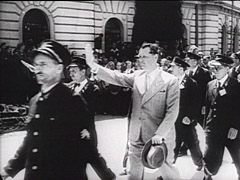

[Ante] Pavelic, the chief of state of Croatia, announces the commentator, the defender of religious freedom, which he brought to the people of this territory whom he has liberated from oppression. Croatia is predominantly Catholic, but has a large share of Orthodox adherents as well. In an effort to secure their support, and the support of the Bosnians, traditionally oriented towards Orthodox Serbia, Pavelic created the Croat Orthodox Church. Says the commentator, several thousands recruits to the Black Legion declare the oath of allegiance as they unite under the banner of repression of terrorist bands. The Ustase, Pavelic's elite guard, are disintegrating now due to the corruption of their membership and disrepute even in German eyes. This may possibly be the reason for emphasizing the Black Legion, the regular armed force.
[Ante] Pavelic, the chief of state of Croatia, announces the commentator, the defender of religious freedom, which he brought to the people of this territory whom he has liberated from oppression. Croatia is predominantly Catholic, but has a large share of Orthodox adherents as well. In an effort to secure their support, and the support of the Bosnians, traditionally oriented towards Orthodox Serbia, Pavelic created the Croat Orthodox Church. Says the commentator, several thousands recruits to the Black Legion declare the oath of allegiance as they unite under the banner of repression of terrorist bands. The Ustase, Pavelic's elite guard, are disintegrating now due to the corruption of their membership and disrepute even in German eyes. This may possibly be the reason for emphasizing the Black Legion, the regular armed force.
Croatia
1944
[1:10]
Ante Pavelic was a Croatian fascist leader who headed a pro-German government in Croatia from 1941 until 1945. This captured German newsreel shows Pavelic walking through an adoring crowd and reviewing his units. Under Pavelic's rule, the Croatian government killed hundreds of thousands of Serbs, Jews, and Roma (Gypsies). Pavelic fled to Argentina after the war. He died in 1959 from wounds he received in an assassination attempt two years earlier.
English narration by U.S. Office of Strategic Services
— National Archives - Film
Collaboration »
Collaboration (Abridged Article) »